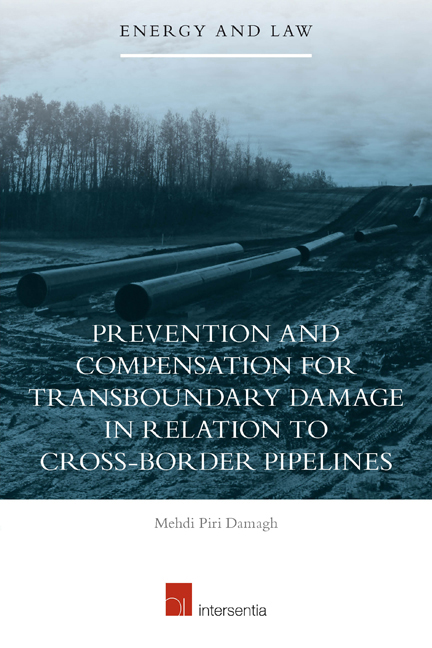Book contents
- Frontmatter
- Dedication
- Acknowledgements
- Contents
- Abbreviations
- List of Tables and Maps
- Chapter 1 Introduction
- PART I INTRODUCTORY ISSUES: PIPELINES, THE NATURE OF RISKS ASSOCIATED WITH PIPELINES AND THEIR REGULATORY REGIMES
- PART II PREVENTION OF CROSS-BORDER PIPELINE ACCIDENTS – MEANS AND SOURCES
- PART III STATE RESPONSIBILITY FOR TRANS-BOUNDARY DAMAGE CAUSED BY PIPELINES
- Introductory Note
- Chapter 8 The Origin of State Responsibility
- Chapter 9 Responsibility of States to Ensure Adequate Compensation for Transboundary Damage Caused by Oil and Gas Pipelines Laid under Their Jurisdiction and Control
- Chapter 10 Responsibility of States for Trans-boundary Damage Caused by the Prohibited Operation of Oil and Gas Pipelines
- Chapter 11 Conclusion and Policy Recommendations
- Summary
- Bibliography
- Valorisation Addendum
- Curriculum Vitae
Chapter 9 - Responsibility of States to Ensure Adequate Compensation for Transboundary Damage Caused by Oil and Gas Pipelines Laid under Their Jurisdiction and Control
from PART III - STATE RESPONSIBILITY FOR TRANS-BOUNDARY DAMAGE CAUSED BY PIPELINES
Published online by Cambridge University Press: 13 December 2017
- Frontmatter
- Dedication
- Acknowledgements
- Contents
- Abbreviations
- List of Tables and Maps
- Chapter 1 Introduction
- PART I INTRODUCTORY ISSUES: PIPELINES, THE NATURE OF RISKS ASSOCIATED WITH PIPELINES AND THEIR REGULATORY REGIMES
- PART II PREVENTION OF CROSS-BORDER PIPELINE ACCIDENTS – MEANS AND SOURCES
- PART III STATE RESPONSIBILITY FOR TRANS-BOUNDARY DAMAGE CAUSED BY PIPELINES
- Introductory Note
- Chapter 8 The Origin of State Responsibility
- Chapter 9 Responsibility of States to Ensure Adequate Compensation for Transboundary Damage Caused by Oil and Gas Pipelines Laid under Their Jurisdiction and Control
- Chapter 10 Responsibility of States for Trans-boundary Damage Caused by the Prohibited Operation of Oil and Gas Pipelines
- Chapter 11 Conclusion and Policy Recommendations
- Summary
- Bibliography
- Valorisation Addendum
- Curriculum Vitae
Summary
INTRODUCTION
Previously in Chapter 8 a theoretical framework that will help to explain the idea of the state responsibility for the compensation of trans-boundary damage caused by oil and gas pipelines was presented. In theory, it was mentioned that states are obliged to endeavour not to let the polluters externalize trans-boundary damage. Accordingly the states are obliged to prevent trans-boundary damage and to ensure that the polluter will compensate the victims of such damage as primary obligations. In addition, failure to observe the obligations to prevent and to respond to trans-boundary damage by a source state where the activity is carried on within its jurisdiction or control, as discussed in Part II, may trigger state responsibility under the secondary norms of international law. The most important binding sources of international environmental law are the treaties. Scholars even suggest that compliance with customary international law has been facilitated by incorporating many of its rules through the treaties. In the context of the liability for trans-boundary damage there are only very limited positive obligations arising from treaty law. In this Chapter, an attempt is made to address the responsibility of states for the injurious consequences of oil and gas pipelines under the relevant conventions as well as principles codified by the International Law Commission.
The operation of cross-border pipelines similar to any other industrial activities is exposed to the risk of accident. Furthermore, pipelines have been subject to deliberate attacks in several cases. Therefore, in spite of exercising due diligence the possibility of the occurrence of pipeline incidents is still high enough to put pipeline in the list of hazardous activities. It has already been discussed that the source state is internationally obliged to exercise due diligence which is mainly in the form of adopting and enforcing appropriate regulations. In general terms, accidental damage may be caused as a result of a failure to exercise due diligence or notwithstanding that due diligence had been exercised. In the same way as with non-accidental damage, if the source state fails to exercise due diligence, it will be held internationally responsible, taking into account the unlawfulness of the activity (the lack of due diligence and the occurrence of trans-boundary damage).
- Type
- Chapter
- Information
- Prevention and Compensation for Transboundary Damage in Relation to Cross-border Oil and Gas Pipelines , pp. 349 - 380Publisher: IntersentiaPrint publication year: 2015

